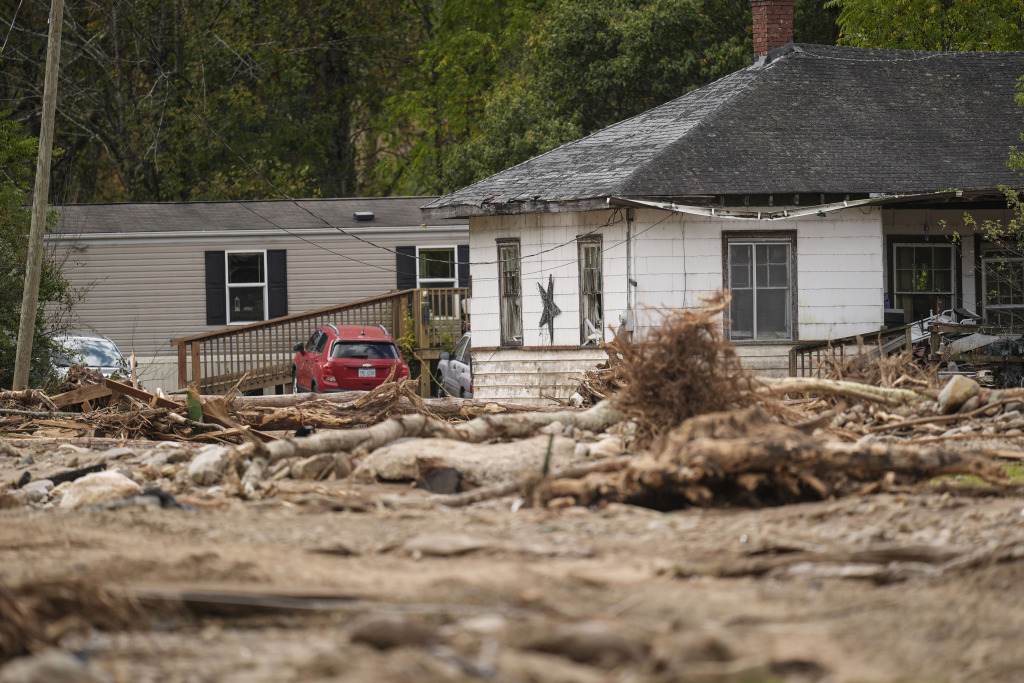Hurricane Helene’s death toll reached 200 on Thursday, with the potential to rise further as search teams worked to access the most remote areas in the mountains of western North Carolina. The storm has washed out roads and left many without electricity, water, or cellular service.
Officials in Georgia and North Carolina added to their states’ tallies, bringing Helene’s death count to make it the deadliest U.S. mainland storm since Hurricane Katrina in 2005. A week after the storm made landfall in Florida and carved a destructive path through the Southeast, connections between friends, neighbors, and even strangers have become a source of hope for those in the worst-affected areas.
While government cargo planes delivered essential supplies, and rescue crews searched for survivors, communities leaned on each other for support. Sarah Vekasi, owner of Sarah Sunshine Pottery in Black Mountain, North Carolina, is struggling with the trauma of Hurricane Helene and uncertainty over her business. “All I can say is that I’m alive. I’m not doing great. I’m not doing good. But I’m extremely grateful to be alive, especially when so many are not,” she said.

One thing that brings her comfort is the daily town meeting at the square, where over 150 people gathered on Wednesday to receive updates from local leaders. “It’s incredible being able to meet in person,” said Vekasi, who had been cut off by impassable roads for days.
Martha Sullivan, a longtime resident of Black Mountain, carefully took notes at the meeting to share with others. Despite being invited by her children to move to Charlotte, she chose to stay in her community. “I’m going to stay as long as I feel like I’m being useful,” she said.
Volunteers went out on Wednesday to locate people
In the remote mountain areas, helicopters airlifted the stranded to safety, while search crews cleared fallen trees to check for survivors. Power restoration efforts were underway, with outages dropping below one million for the first time since last weekend, primarily in the Carolinas and Georgia. Helene made landfall on Florida’s Gulf Coast on Sept. 26 as a Category 4 hurricane, and deaths have since been reported in Florida, Georgia, Tennessee, Virginia, and the Carolinas.
Robin Wynn lost power at her Asheville home and had to wade through knee-deep water to reach a shelter. “I didn’t know where I was going, didn’t know what was going to happen next. But I got out and I’m alive,” she said. Since returning home, her neighbors have supported each other, ensuring everyone has food and water.
Eric Williamson of First Baptist Church in Hendersonville has been visiting community members who cannot leave their homes, providing food and comfort. “We’re bringing them food and water, but also just bringing them a smile and a prayer to give them comfort,” he said.
In Asheville, volunteers went out on Wednesday to locate people unreachable due to phone and internet outages, carrying drinking water and promising to return with updates.
Notifying relatives of the deceased has been challenging due to communication difficulties. “No cell service, no way to reach out to next of kin,” said Avril Pinder, an official in Buncombe County, where at least 61 people have died. Search and rescue operations have continued for seven days, but many areas remain isolated due to landslides and washed-out bridges.
On Thursday, President Joe Biden visited Keaton Beach, Florida, to meet with survivors and assess the damage. He walked among the wreckage, meeting residents who had lost homes and were living out of trailers. Biden also planned to visit Georgia, and his administration has pledged federal assistance for debris removal and emergency measures for affected states.
In Tennessee, a plastics factory was flooded, resulting in the deaths of two workers, with several others still missing. Authorities are investigating claims that employees were not allowed to leave in time to avoid the storm.
Hospitals and healthcare facilities across the Southeast remained open, despite facing power outages, wind damage, and flooding. In Florida, “low-risk” state prisoners were deployed to help with debris removal, Governor Ron DeSantis announced.